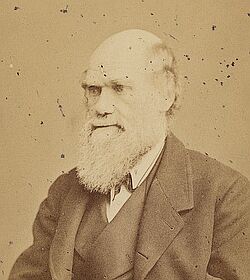09
“Disproving” Darwin
Posted by jns on February 9, 2009 This is birthday boy Charles Robert Darwin (1809-1882), born 200 years ago on 12 February 1809. This photograph (which I have cropped) was taken in 1882 by the photographic company of Ernest Edwards, London.*
This is birthday boy Charles Robert Darwin (1809-1882), born 200 years ago on 12 February 1809. This photograph (which I have cropped) was taken in 1882 by the photographic company of Ernest Edwards, London.*
Many people call Darwin’s great idea, common descent through evolution by means of natural selection, the greatest scientific discovery ever. Maybe. It’s certainly big. My hesitation is merely a reflection of my feeling that it’s really difficult to prioritize the great ideas and discoveries of science and math into a hierarchy that would assign the top position to one idea alone. No doubt it’s the over cautious precision of my inner scientist asserting itself.
Almost since the pages of Origin of Species were first sewn into a book there has been a cottage industry of trying to “disprove Darwin”. So strongly associated is his name with the big idea that “Darwin” and “Darwinism” serve as effigies for those who revile the idea so much that they expend considerable energy looking for anything that might weaken the authority of the idea so that it can be toppled from its scientific pantheon.
Unfortunately for their efforts, they sorely misunderstand how science works and, therefore, how futile their efforts are. Detractors seem to believe they are operating under junior debating-society rules where locating any hint of a logical inconsistency in the “theory”, or any modern deviation from what they think is Darwinian orthodoxy, is certain to be a fatal blow to the hated “theory”. Alas, they hope to disprove Darwin but can only disapprove and look silly and naive.
The biggest impediment to tearing down the edifice of “Darwinism”, of course, is reality. Scientists believe that reality has a separate, objective existence that affords no special place to humans. One corollary to this is that objective reality is what it is regardless of our most fervent desires, regardless of our prayers to a supernatural deity to change it, regardless of the stories we tell ourselves over and over about how we would like it to be. Deny reality for your own psychological benefit as needs must, but you will not alter reality by doing so.†
But, suppose there are chinks in the armor of “Darwinism”–isn’t that fatal? Well, no. Great ideas that flow into the vast river of science stay if they are useful ideas. Depending on utility they may change, grow, even evolve over time, but they’re frequently treated as the same idea. Creators do not have veto power over how their scientific ideas are used, nor how they are changed or updated, although they continue to get the credit for great ideas. The way we understand and describe gravity is nothing recognizable to Newton, but he continues to get credit as the discoverer of “universal gravitation”.
But aren’t wrong theories, those that have been “disproven” by logical errors or deviations from precise descriptions of reality, immediately discarded as useless? Oh no, far from it. See the aforementioned Newtonian theory of gravity for but one ready example.‡
This is the trade-off: a somewhat inaccurate (or “wrong”) but productive theory is of far more use to science than a correct but sterile idea. By “productive” I refer to ideas that lead one to new ideas, new experiments, and new understandings. Compare that notion with what some would have you believe is the undeniable perfection of revealed truth from a divine creator: it is an investigative dead end, it leads to no new ideas whatsoever, it affords no solution beyond the parental disclaimer, “because”.
 “Why” is the path science follows, not “because”. I believe that “why” is the more interesting and the more valuable path to follow, at least when it comes to understanding how the universe works. One may feel free to disagree on its value and utility, of course, but denying its reality is futile.
“Why” is the path science follows, not “because”. I believe that “why” is the more interesting and the more valuable path to follow, at least when it comes to understanding how the universe works. One may feel free to disagree on its value and utility, of course, but denying its reality is futile.
———-
* The photograph is part of the wonderful collection of “Portraits of Scientists and Inventors” from the Smithsonian Institution, which we have sampled here before and undoubtedly will again and again, photographs they have contributed to the Flickr Commons Project. (The Flickr page; the persistent URL)
† This is probably the source of the calm, know-it-all demeanor that atheists tend to exhibit, and that so inflames those who would consign us prematurely to the flames of hell: all the evidence we see about how the world really operates fails to suggest that a creator-deity exists–not to mention a personal-coach-deity–and no amount of wishful thinking can change reality.
‡ Sometime we’ll talk about the contingent nature of scientific “truth” and how uncomfortable that idea is for those with an absolutist predilection.